Liz Truss' energy policy: Will it help people pay their bills?
- Published
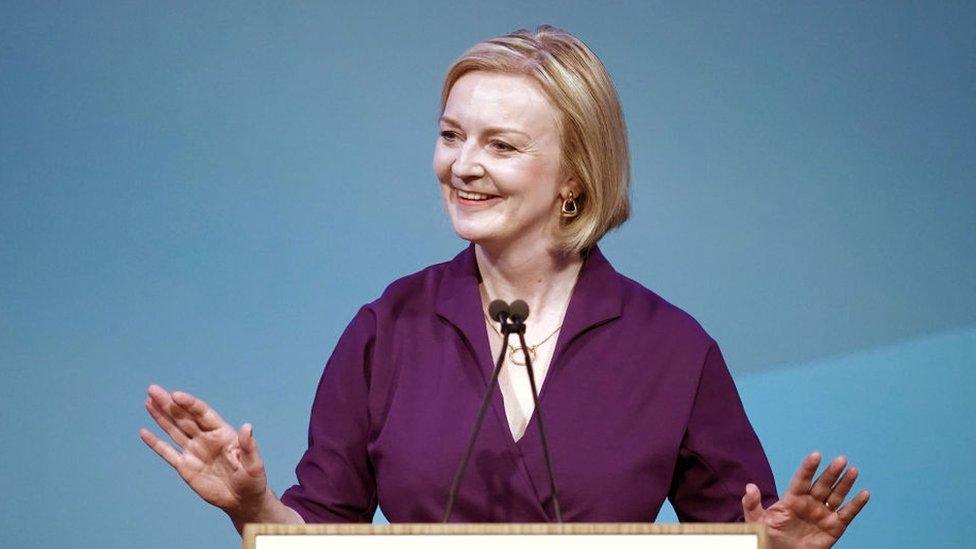
As Liz Truss traversed the UK racking up the votes to defeat Rishi Sunak, in the same towns where she wooed the membership hustings, including in leafy apparently affluent areas, the size of the challenge she was vying to inherit was getting notably worse.
The situation on the ground has deteriorated for ordinary households and businesses, as prices continued to surge yet higher. And at the same time there has been an ominous turn in the markets for British government borrowing and in currency markets.
The combination of these two changes alter the reality of the situation she now takes on as prime minister. The question is how much it changes the immediate solutions she has promised as campaigner.
From Durham to Derbyshire and Stoke-on-Trent and beyond, the stories we have reported on in many local communities show the real life depths of this cost of living crisis, even at current energy prices.
The surge in food prices is breaking the charitable model of food banks and food pantries that have emerged in almost every town and city.
Not only has demand surged, turning many of last year's food charity donors into recipients of support, but supplies are now a problem.
Many of these projects are reliant on surplus food stocks from supermarket supply chains. But supermarkets facing massive inflationary pressures, trying to avoid passing on all of those price hikes to consumers, have been trimming surplus stock, meaning there is less tinned goods available for donations.
Demand up hugely, at a time when supply is a problem. This is just one manifestation of out-of-control inflation.
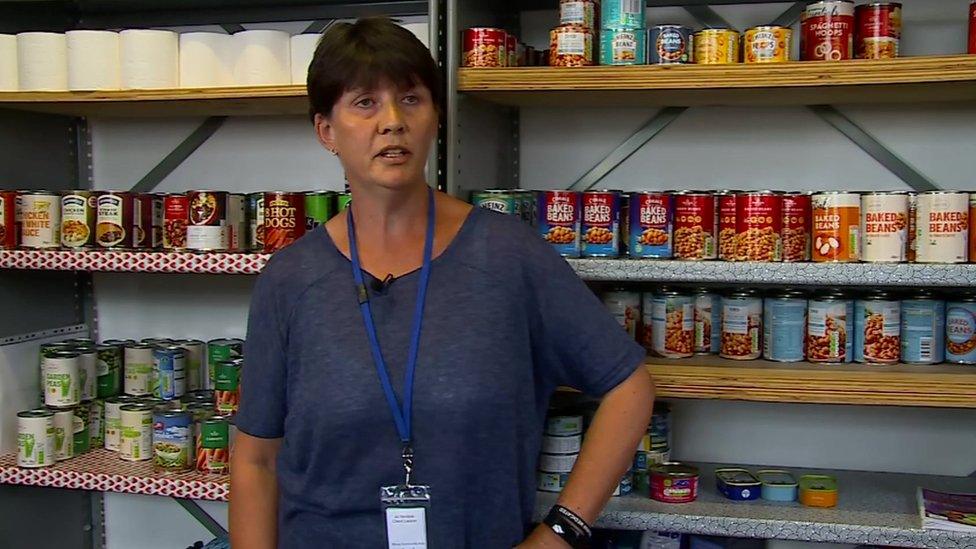
Jo Yendole from Stone Community hub says some people have stopped using hot water
We visited a facility in Stone, Staffordshire. Jo Yendole who helps run Stone Community hub said: "One of the guys who's on licence from prison, sort of struggling to maintain his flat and the cost of his flat actually said he would prefer to go back to prison because it was easier because he just couldn't see how we were going to afford to live.
"And another lady who she was she's talking about the cost of gas and an energy prices said she'd completely turned her boiler off and wasn't using any hot water and was boiling a kettle. The gas price is not even affordable in the summer for her".
At a pantry in Matlock, Derbyshire, which offers subsidised food at about a tenth of supermarket prices, Beverley Parker from Rural Action Derbyshire told me people were returning fresh food, because they could not afford refrigeration costs.
"We've heard of people switching off their fridges and freezers because they can't afford the electricity. You're risking your own health and that of your family, by eating food that hasn't been stored correctly.
"A lot of people are choosing to either get rid of their cars or not use them. Public transport in the countryside is limited at best. So we've we've even heard of people walking six miles from the food bank, and then six miles back home, because they can't afford the bus fare."
At another community hub in Peterlee, County Durham, I met dual-income working families who had started to grow their own vegetables and heard the co-ordinators tell of clients pre-emptively cancelling energy bill direct debits. Much of this happened even before the move in prices up to £3,549.

While the energy companies have tried to pre-empt the arrival of Liz Truss with a ready to go plan to cancel the rise in the energy cap, that might not require upfront borrowing, there are still huge amounts of support being relied upon, even at existing bills.
One energy company boss, former government fuel poverty tsar Derek Lickorish who is chairman of Utilita, told me the reality for the poorest customers. A typical £50 on prepayment meters which would ordinarily last 12 days in winter, might only last two days from January.
"Liz Truss has said that she intends to solve this problem, and I welcome that. This is a war footing to my mind. It will affect government borrowing.
"If we don't, we're going to have major problems with customers having unaffordable bills. There'll be huge mental health problems, we will see businesses going broke, we'll see people losing their jobs and they want to have disposable income to spend with businesses. It really is Armageddon, if we don't deal with this, and that's what we've got to get on with it".
So as we head towards some version of the energy companies tariff deficit fund being announced imminently by the new prime minister, she faces further pressure from the markets.
The dollar has been strong as the US central bank, the Federal Reserve, has indicated a sharper rise in interest rates. But sterling has fallen notably against the dollar and the euro.
Long-term borrowing costs for the government have topped 3%, setting the floor for borrowing for mortgages and for businesses.
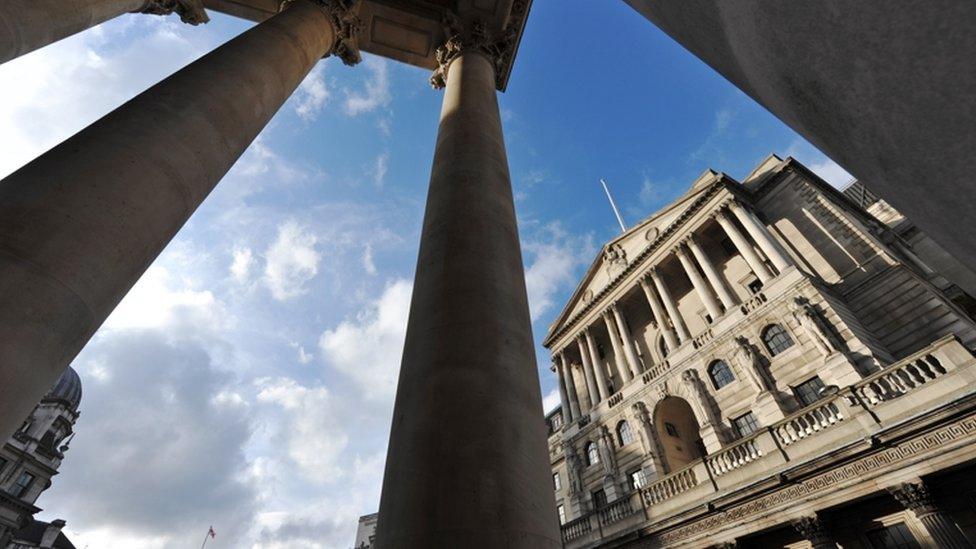
The government will have to work closely with the Bank of England
These are jitters rather than a crisis. In that context it was notable to see both Ms Truss and her likely Chancellor, Kwasi Kwarteng, row back from her early campaign rhetoric criticising the Bank of England.
The government and Bank will need to work very closely together in the coming months.
An important difference with the pandemic bailout is there can be no expectation that the Bank will buy up most of the issuance of extra government borrowing. The Bank has already indicated it will do the opposite soon as part of "reverse QE". If the government needs to borrow more, it will have to find buyers for the debt among pension funds, insurers and foreign buyers, and pay a high price.
If the PM wants to abide by her campaign promises to make tens of billions of tax cuts, and help launch an energy bailout for both households and businesses, at a time when energy prices in markets could go yet higher, borrowing will have to go up in the first instance.
But if she does not help both sectors, disposable income will drain from the economy, and many small businesses will simply go bust, hiking up unemployment too.
The new prime minister already faced a very tricky balancing act between inflation and recession. The past month means the room for manoeuvre has got even smaller. Given this hand, Rishi Sunak may not end up regretting his loss.
Related topics
- Published6 September 2022
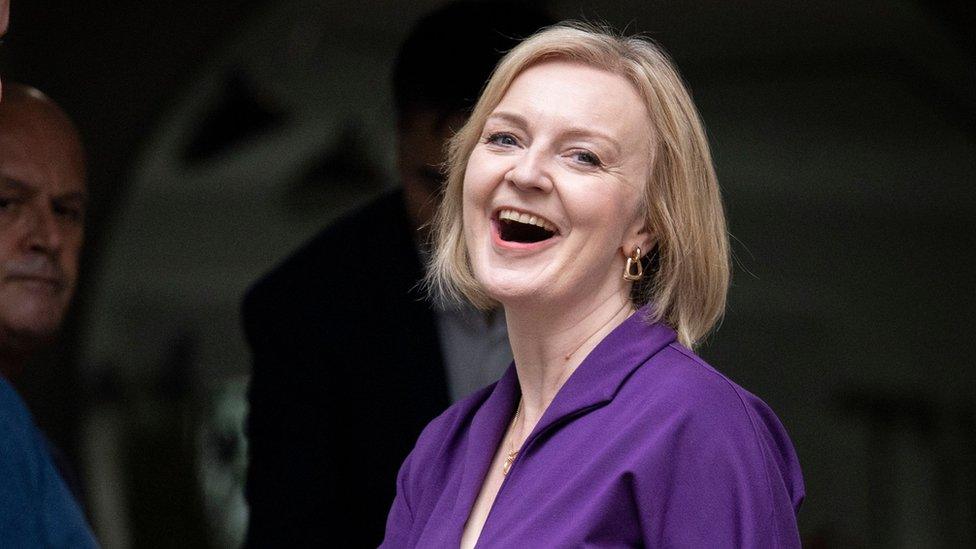
- Published6 September 2022

- Published5 September 2022
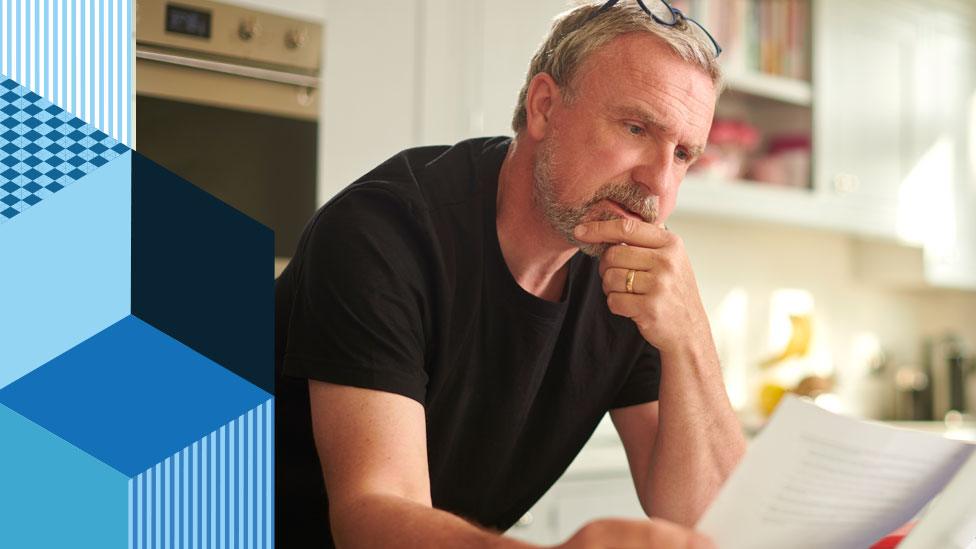
- Published2 September 2022

